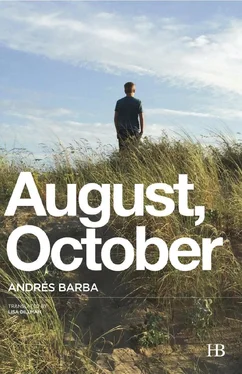“Do you know those girls?” Anita asked.
“No. Well, yeah, one of them.”
The girls huddled in a little circle, colluded, told the retarded girl something or other, and then a second later they all turned toward him, openly gaping. He felt a jolt of mortification and looked away.
“They’re pointing at you,” Anita said.
When he turned back, the retarded girl was headed for their table, still out of breath from her swim, legs still sandy; the others hung back and watched closely. She made it to where they sat and planted herself before them. From up close, she looked almost like some kind of make-believe creature — a naiad, a semi-amphibious being. Her back was too beefy, her head small and compressed, and her mouth took up most of her face; she had straight, shoulder-length hair, plastered to her skull, two thick-set legs, and hips as wide and powerful as a mare’s haunches. She even looked rough to the touch. The only thing that seemed truly alive were her eyes and hands, which had a life of their own, moving independently from the other parts of her body, although she didn’t seem capable of perceiving that disconnect. From the outside, she gave the impression that on the inside, her brain was full of warm tunnels, all pulsating and palpitating, and that within them something ordinary and yet simultaneously unimaginable was taking place, as if reality had splintered into tiny shards within her.
She’d exploded into the café so recklessly that, without meaning to, she crashed into a woman, inciting great expectancy. Everyone stared with a compassionate sort of exasperation. She turned to the other girls and shouted from right where she stood.
“Thiiiiiiiiis one?”
He saw her point to him and began to sweat profusely. The girls said yes from off in the distance. Then she turned back to him, as though she’d known him all his life, joyful as a dog who’s just found the stick he was thrown.
“Frani says she had fun the other day and you should meet up again if you want and she owes you something.”
Her voice was unbelievably nasal, and since she’d just run all the way from the shore, she was panting, too. A vein in her neck throbbed. The entire café had turned to watch. Twenty or so people with nothing to do, as was always the case with the people in that café, forever waiting for something of interest to occur on the esplanade. And here he was, handing it to them on a silver platter — he was choice entertainment, and they had front-row seats. They smirked hatefully and would recount everything they’d seen the minute they got home, in the protracted way that made banal events take on great significance only in the summer.
She was awaiting his reply.
“Tell Frani we’ll see, another day,” he replied.
The girl shot out like a flash, as though his words themselves had now become the stick, and the stick were flying through the air several yards ahead of her, toward the girls. She had a grimly comical way of running, as though trying to restrain herself a little. It was as if she’d been told repeatedly not to run like that and were trying not to but having no success — or having success only when she remembered, because she did it jerkily. Each step slapped noisily against the esplanade’s white tiles.
Humiliated, he took advantage of her exit to pay as quickly as possible and snatched Anita up by the hand, yanking her almost airborne from the café.
“I don’t want to go,” Anita complained.
“Well, I do .”
He wanted to flee as quickly as possible and forced himself not to look back at the girls again, but before they’d made it even ten yards down the walk, toward the house, he heard the aggressive sound of her footfalls slapping behind him once more.
“Look, she’s coming back,” Anita said.
He turned and once again found her before him, breathing heavily. On her face, exhaustion had a cruel and uncouth quality to it.
“Frani says when’s another day and to tell her when another day is so she knows when.”
She was almost out of breath. Her insistence struck him as odd, as though she were trying to make some linguistic subtlety clear to a person who barely speaks the language, but there was no way to avoid it, those were the rules of the game. The girl herself seemed part of the game, as well, an inconceivable messenger huffing and puffing pitifully, in exhaustion, eyes bright with expectation because he was about to tell her something that she would then have to relay to someone else, and she looked so devoted, so capable of carrying on like that ad infinitum, that for a second he forgot the mortification that had caused him to leap up and rush from the café. How old was she? Fifteen? Twenty? Twenty thousand years old?
“Tell Frani I don’t know; my aunt is dying, I have to go to the hospital every day.”
He said my aunt is dying as though saying the world is going to end in two hours, what does it matter if you and I see each other ? The girl stood stock still then, and the involuntary smile that excitement had plastered on her face fizzled strangely, as though being rolled up.
“Your aunt. Poor thing,” she said.
“Yeah, poor thing.”
When she ran off this time, she did it even faster and more earnestly. And she was no longer worried about trying to run at all attractively. Her bathing suit had crept up her butt, and she made no attempt to pull it out; it was as though she were no longer concerned about her body being exposed to the curiosity of others.
At the hospital with Aunt Eli, when he closed his eyes, he pictured Frani sucking his dick. They were back in the dunes, and all he could see was the top of her head, moving evenly, rhythmically, bobbing like a set of waves. The image bristled with impatience, full of tiny, violent particles, elusive and abstract, he pictured something like a slide, lined with silky, smooth animal fur, bathed in a silvery light; sometimes the image was crisp, but a strange noise was all it took for it to vanish, and there were constantly strange noises. Dark images overlapped. What could they possibly know about Aunt Eli’s desires, or her pain? Each of them felt a bit humiliated in her presence, even his father.
“What are you thinking about?” his mother asked one time as they were walking out of the room.
And his father replied crisply, “I was thinking what a fool I am.”
“Why would you say something like that?”
“I don’t know.”
And yet each morning and evening with delirious-Aunt-Eli followed a very similar pattern, one they’d only be able to make sense of much later. First she went into a state akin to fear, defiance. She’d always been prone to hyperbole, even when her emotions were genuine.
“I still love you; it’s pathetic, but I still love you,” she said, staring at his father.
“But — what did I ever do to you?”
“What did you do to me? You were ashamed of me. You abandoned me in this piece-of-shit town, that’s what you did. I want it to hurt you as much as it does me.”
Then would come remorse, and she’d fall silent. Pulling her hand from beneath the sheets (it was queasy-making, the way she had a constant chill despite the heat), she would reach out to him. His father would immediately take her hand, hurt, his face red as a just-fired brick, and for a few minutes it was as if through their hands, their contact, everything she’d just said was washed away, or perhaps one thing mysteriously compensated for the other. Her father would ask something banal.
“Do you like looking out the window? Would you like us to ask if your bed can be moved over by the window?”
And she’d say yes. The three of them moved her bed to the window, and then the next phase seemed to set in, a phase in which Aunt Eli would start to forget things. She closed her eyes, and he got the feeling her brain had become some sort of dark, silent theater — that what her brain thought and what her senses felt were one single, indistinguishable thing.
Читать дальше












